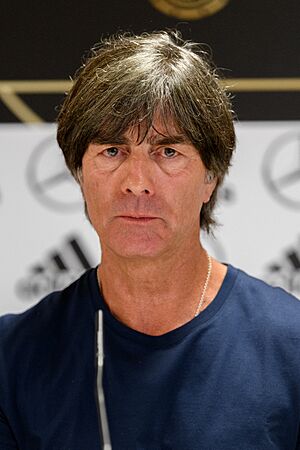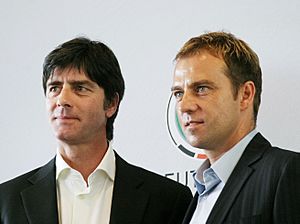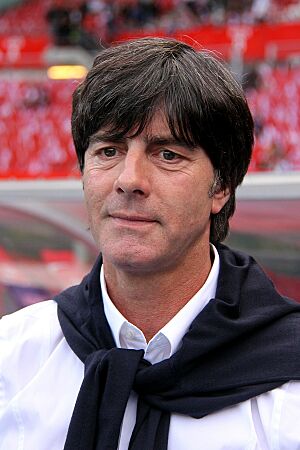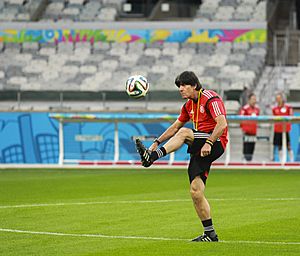Joachim Löw facts for kids

Löw as Germany manager in 2018
|
|||||||||||||||||||||||||||||||||||||
| Personal information | |||||||||||||||||||||||||||||||||||||
|---|---|---|---|---|---|---|---|---|---|---|---|---|---|---|---|---|---|---|---|---|---|---|---|---|---|---|---|---|---|---|---|---|---|---|---|---|---|
| Date of birth | 3 February 1960 | ||||||||||||||||||||||||||||||||||||
| Place of birth | Schönau im Schwarzwald, West Germany | ||||||||||||||||||||||||||||||||||||
| Height | 1.82 m (6 ft 0 in) | ||||||||||||||||||||||||||||||||||||
| Position(s) | Attacking midfielder | ||||||||||||||||||||||||||||||||||||
| Youth career | |||||||||||||||||||||||||||||||||||||
| TuS Schönau 1896 | |||||||||||||||||||||||||||||||||||||
| FC Schönau | |||||||||||||||||||||||||||||||||||||
| Eintracht Freiburg | |||||||||||||||||||||||||||||||||||||
| Senior career* | |||||||||||||||||||||||||||||||||||||
| Years | Team | Apps | (Gls) | ||||||||||||||||||||||||||||||||||
| 1978–1980 | SC Freiburg | 71 | (18) | ||||||||||||||||||||||||||||||||||
| 1980–1981 | VfB Stuttgart | 4 | (0) | ||||||||||||||||||||||||||||||||||
| 1981–1982 | → Eintracht Frankfurt (loan) | 24 | (5) | ||||||||||||||||||||||||||||||||||
| 1982–1984 | SC Freiburg | 65 | (25) | ||||||||||||||||||||||||||||||||||
| 1984–1985 | Karlsruher SC | 24 | (2) | ||||||||||||||||||||||||||||||||||
| 1985–1989 | SC Freiburg | 116 | (38) | ||||||||||||||||||||||||||||||||||
| 1989–1992 | FC Schaffhausen | 96 | (23) | ||||||||||||||||||||||||||||||||||
| 1992–1994 | FC Winterthur | 57 | (12) | ||||||||||||||||||||||||||||||||||
| 1994–1995 | FC Frauenfeld | ||||||||||||||||||||||||||||||||||||
| International career | |||||||||||||||||||||||||||||||||||||
| 1979–1980 | West Germany U21 | 4 | (0) | ||||||||||||||||||||||||||||||||||
| Managerial career | |||||||||||||||||||||||||||||||||||||
| 1992–1994 | FC Winterthur (youth) | ||||||||||||||||||||||||||||||||||||
| 1994–1995 | FC Frauenfeld | ||||||||||||||||||||||||||||||||||||
| 1995–1996 | VfB Stuttgart (assistant) | ||||||||||||||||||||||||||||||||||||
| 1996 | VfB Stuttgart (interim) | ||||||||||||||||||||||||||||||||||||
| 1996–1998 | VfB Stuttgart | ||||||||||||||||||||||||||||||||||||
| 1998–1999 | Fenerbahçe | ||||||||||||||||||||||||||||||||||||
| 1999–2000 | Karlsruher SC | ||||||||||||||||||||||||||||||||||||
| 2000–2001 | Adanaspor | ||||||||||||||||||||||||||||||||||||
| 2001–2002 | Tirol Innsbruck | ||||||||||||||||||||||||||||||||||||
| 2003–2004 | Austria Wien | ||||||||||||||||||||||||||||||||||||
| 2004–2006 | Germany (assistant) | ||||||||||||||||||||||||||||||||||||
| 2006–2021 | Germany | ||||||||||||||||||||||||||||||||||||
|
Medal record
|
|||||||||||||||||||||||||||||||||||||
| *Club domestic league appearances and goals | |||||||||||||||||||||||||||||||||||||
Joachim "Jogi" Löw (born 3 February 1960) is a famous German football coach and former player. He was the manager of the Germany national team for many years, from 2006 until 2021. During his time as manager, he led Germany to win the 2014 FIFA World Cup in Brazil. He also guided them to victory in the 2017 FIFA Confederations Cup in Russia. Löw managed and won more matches than any other head coach of the Germany national football team.
Contents
- Playing Football: Jogi Löw's Early Career
- Becoming a Coach: Jogi Löw's Managerial Journey
- Personal Life
- Managerial Statistics
- Honours and Awards
- See also
Playing Football: Jogi Löw's Early Career
In 1978, Jogi Löw began his football journey as a player. He started with SC Freiburg, a club in the 2. Bundesliga. He played for Freiburg three times in his career. For a long time, he held the record for the most goals scored for the club. In 1980, Löw joined VfB Stuttgart in the top German league, the Bundesliga. However, he didn't play many matches there.
Löw also played for Eintracht Frankfurt for one season. After that, he returned to SC Freiburg and scored many goals. He then played for Karlsruher SC before joining Freiburg again. Löw finished his playing career in Switzerland. He played for FC Schaffhausen and FC Winterthur. He also played four times for the West Germany national under-21 team.
Becoming a Coach: Jogi Löw's Managerial Journey
Club Management: Early Coaching Years (1992–2004)
Starting as a Youth Coach
Jogi Löw started coaching while he was still playing football. He worked as a youth coach for FC Winterthur. Later, in 1994–95, he became a player-coach for FC Frauenfeld. This meant he played and coached at the same time.
Leading VfB Stuttgart
In 1995, Löw became an assistant coach for VfB Stuttgart. The head coach, Rolf Fringer, left to coach the Switzerland national team. So, Löw became the main manager on 14 August 1996. His first game as head coach was a big 4–0 win against Schalke 04. Stuttgart finished fourth in the league in his first season.
In the 1997–98 season, Stuttgart reached the final of the DFB-Ligapokal, but lost to Bayern Munich. They also made it to the semi-finals of the DFB-Pokal, where they lost to Bayern Munich again. Löw also led Stuttgart to the final of the UEFA Cup Winners' Cup. They played against Chelsea but lost 1–0. Löw left Stuttgart shortly after this match.
Coaching in Turkey and Austria
After Stuttgart, Löw moved to Turkey to manage Fenerbahçe in 1998. His team finished third in the Turkish league. He then returned to Germany to manage Karlsruher SC in 1999. However, this was a short and difficult period. The team was struggling, and he left in April 2000.
Löw went back to Turkey to coach Adanaspor in 2000. This time was also tough, and he didn't win any matches before leaving. Next, he moved to Austria. He became the manager of Tirol Innsbruck in 2001. He led them to win the Austrian Bundesliga title in 2002. Sadly, the club went bankrupt that same year. Löw then coached Austria Wien from 2003 to 2004. His team won the 2003 Austrian Supercup.
Germany National Team: Assistant Manager (2004–2006)
In 2004, Jürgen Klinsmann became the head coach of the Germany national football team. Klinsmann chose Jogi Löw as his assistant manager. They had a similar idea about how football should be played: focusing on attacking and scoring goals. Under their leadership, Germany reached the semi-finals of the 2005 FIFA Confederations Cup and the 2006 FIFA World Cup.
In the 2005 Confederations Cup, Germany scored the most goals in the tournament. They finished in third place. At the 2006 World Cup, which was held in Germany, the team played very well. They won their group matches and beat Sweden in the round of 16. They then had a tough match against Argentina, winning after a penalty shootout. In the semi-final, Germany lost to Italy in extra time. They finished third by beating Portugal 3–1.
Klinsmann and Löw also brought new ideas to the team. They focused on developing young players and improving fitness. They also added a "Business Manager" and a mental coach to help the players.
Germany National Team: Head Manager (2006–2021)
Leading Germany to Euro 2008
On 12 July 2006, Jürgen Klinsmann decided not to continue as Germany's coach. So, Jogi Löw was chosen as the new manager. He signed a two-year contract. Löw wanted to continue the attacking style of play that he and Klinsmann had started. He focused on making players pass the ball faster. His goal was to win Euro 2008. His first game was a 3–0 win against Sweden.
Germany had a great start in the qualifying matches for Euro 2008. They won their first five games, which was the best start for a new Germany coach ever. They qualified for the tournament. At Euro 2008, Germany won their first group game against Poland. They lost to Croatia but won against Austria to reach the quarter-finals. Löw was sent off during the Austria game for arguing.
In the knockout stages, Löw changed the team's formation. Germany beat Portugal 3–2 in the quarter-finals. They then won against Turkey 3–2 in the semi-finals. Germany reached the final but lost 1–0 to Spain.
2010 FIFA World Cup Journey
Germany qualified for the 2010 FIFA World Cup in South Africa without losing a single match. Löw brought many young players to the World Cup. Germany had one of the youngest teams in the tournament. They won their group and then beat England 4–1 in the first knockout round. Next, they defeated Argentina with a big 4–0 win in the quarter-finals. Germany lost to Spain 1–0 in the semi-finals. They then won the third-place match against Uruguay 3–2, earning bronze medals.
Euro 2012 Performance
Germany had a perfect record in qualifying for Euro 2012, winning all ten of their matches. Löw signed a new contract to stay with Germany until 2014. In the tournament, Germany won all three of their group matches against Portugal, the Netherlands, and Denmark. In the quarter-finals, they beat Greece 4–2. However, Germany was eliminated in the semi-finals after losing 2–1 to Italy.
Winning the 2014 FIFA World Cup
Germany started their 2014 FIFA World Cup journey with a strong 4–0 victory over Portugal. They drew 2–2 with Ghana and then beat the United States 1–0. In the round of 16, Germany won a tough match against Algeria 2–1 after extra time. They then defeated France 1–0 in the quarter-finals.
In the semi-final, Germany played against the host nation, Brazil. Germany won the match with an incredible score of 7–1. This was a historic victory and Brazil's worst defeat in World Cup history. Löw then led Germany to win their fourth World Cup title. In the final, Mario Götze scored the winning goal in extra time against Argentina. After this amazing win, Löw received the FIFA World Coach Of The Year Award in 2014.
Euro 2016 Campaign
Germany began qualifying for Euro 2016 with a win against Scotland. They had some mixed results, including a loss to Poland and a draw with the Republic of Ireland. Löw signed a contract extension until 2018. Germany finished qualifying strongly.
In the tournament, Germany was in Group C. They defeated Ukraine and Northern Ireland and drew with Poland. Germany finished as group winners. In the round of 16, they beat Slovakia 3–0. They then faced Italy in the quarter-finals. After a 1–1 draw, Germany won the match in a penalty shootout. In the semi-finals, Germany lost 2–0 to the host nation, France. This was Germany's first loss in a major tournament to France since 1958.
2017 FIFA Confederations Cup Victory
Germany participated in the 2017 FIFA Confederations Cup. They started with a 3–2 win over Australia. They drew 1–1 with Chile and then beat Cameroon 3–1. This victory marked Löw's 100th win as Germany's coach.
In the semi-final, Germany defeated Mexico 4–1. On 2 July 2017, Löw led Germany to win their first-ever FIFA Confederations Cup title. They won the final 1–0 against Chile.
2018 FIFA World Cup Disappointment
After Euro 2016, Löw decided to continue as Germany manager. He extended his contract until 2022. At the 2018 FIFA World Cup, Germany lost their first group match 1–0 against Mexico. They then won against Sweden 2–1. However, Germany was eliminated in the first round of the World Cup for the first time since 1938. They lost 2–0 to South Korea in their final group game. This was Germany's first-ever exit in the group stage of a World Cup.
UEFA Nations League and Euro 2020 Farewell
Despite the early exit from the 2018 World Cup, Löw stayed on as national team coach. Germany faced challenges in the new 2018–19 UEFA Nations League. In November 2020, Germany suffered a big 0–6 defeat to Spain in the 2020–21 UEFA Nations League. This was Germany's worst defeat since 1931.
On 9 March 2021, Löw announced that he would step down as Germany manager after Euro 2020. On 29 June 2021, England beat Germany in the round of 16 of Euro 2020. This loss meant Germany was out of the tournament, and it also marked the end of Löw's time as Germany's coach. He was the national coach for almost 15 years, which is the longest for an international coach in Europe. His former assistant, Hansi Flick, took over as manager.
Personal Life
Jogi Löw is Roman Catholic. He was an altar boy when he was younger. He married Daniela Löw in 1986. They met in 1978 and were together for eight years before getting married. They do not have children.
Managerial Statistics
| Team | From | To | Record | ||||||||
|---|---|---|---|---|---|---|---|---|---|---|---|
| M | W | D | L | GF | GA | GD | Win % | Ref. | |||
| VfB Stuttgart | 14 August 1996 | 21 May 1998 | 89 | 46 | 20 | 23 | 172 | 107 | +65 | 51.69 | |
| Fenerbahçe | 1 July 1998 | 30 May 1999 | 38 | 24 | 6 | 8 | 88 | 34 | +54 | 63.16 | |
| Karlsruher SC | 25 October 1999 | 19 April 2000 | 18 | 1 | 7 | 10 | 14 | 28 | −14 | 5.56 | |
| Adanaspor | 20 December 2000 | 2 March 2001 | 6 | 0 | 2 | 4 | 9 | 14 | −5 | 0.00 | |
| Tirol Innsbruck | 10 October 2001 | 18 June 2002 | 27 | 13 | 5 | 9 | 33 | 24 | +9 | 48.15 | |
| Austria Wien | 1 July 2003 | 24 March 2004 | 32 | 16 | 8 | 8 | 45 | 24 | +21 | 50.00 | |
| Germany | 12 July 2006 | 29 June 2021 | 198 | 124 | 40 | 34 | 467 | 200 | +267 | 62.63 | |
| Total | 407 | 223 | 88 | 96 | 826 | 430 | +396 | 54.79 | — | ||
Honours and Awards
Team Achievements as Manager
VfB Stuttgart
- DFB-Pokal: 1996–97 (German Cup)
Tirol Innsbruck
- Austrian Football Bundesliga: 2001–02 (Austrian League Champions)
Austria Wien
- Austrian Supercup: 2003
Germany
- 3rd Place: FIFA World Cup: 2010
- FIFA World Cup: 2014 (World Champions!)
- FIFA Confederations Cup: 2017
Individual Awards
- Sport Bild German Sports Manager of the Year: 2010
- German Football Man of the Year: 2011, 2014
- German Football Manager of the Year: 2014
- FIFA World Coach of the Year: 2014
- World Soccer Awards Manager of the Year: 2014
- IFFHS World's Best National Coach: 2014, 2017
- L'Équipe Sports Manager of the Year: 2010
- FIFA World Cup Dream Team: 2014
- Silbernes Lorbeerblatt: 2010, 2014 (Germany's highest sports award)
- Bundesverdienstkreuz am Bande: 2010 (German Federal Cross of Merit)
- IFFHS World's Best Man National Coach of the Decade: 2011–2020
See also
 In Spanish: Joachim Löw para niños
In Spanish: Joachim Löw para niños
 | Sharif Bey |
 | Hale Woodruff |
 | Richmond Barthé |
 | Purvis Young |




